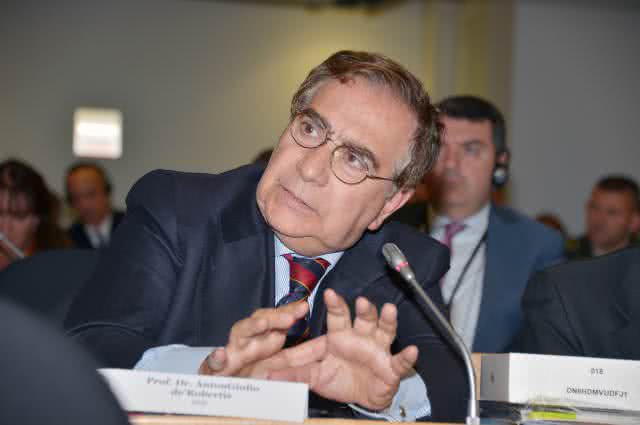Autore: AntonGiulio de’Robertis – 04/03/2019
In the current international system whose main actors appear to be run by “strong men”, such as Trump, Putin, Xi and why not? Erdogan too, the European Union appears to many as a kind of crock pot in the middle of iron vessels. This comparison may appear to be quite inappropriate in spite of the remarkable economic consistency of Europe and the solidity of its institutions. But the real reason for this is to be found far beyond the obvious shortcomings of the modesty of its political class. The real problem is that, according to who is writing, a long – time Democratic and Christian academic and then enthusiastic europeanist furthemore founder of the De Gasperi Foundation of the “heroic” times, Europe has lost its soul: its original inspiration.
The three European communities of the beginning were created in the fifties on the basis of the principles that inspired the creation of the UNO and the now forgotten Briand-Kelllog pact, which had been used at the Nuremberg trial a few years earlier. The new Europe of the ECSC, the EEC and the EURATOM was born on the basis of the rejection of power politics, the outlawed war, the full openness and inclusion and the prevalence of the common interest of Woodrow Wilson on the national interest of the individual states, historically inspiring the power politics.
In the international system created after the Cold War, these principles have been progressively abandoned also due to the sudden actions of Clinton, which far from carrying forward the aperspective understandings that George Bush (father) had agreed with Gorbachev for the establishment of a new international order and the abandonment of power politics, revived, with its directive 25, the national interest and overthrow with the enlargement of NATO that new atlanticism that his predecessor Bush had launched at the Atlantic Council in Brussels after his talks with Gorbachev in Malta .
It is a fact that after the publication of the aforementioned directive 25, which indicated the protection of national interest as the determining ratio of US military interventions abroad, national interest has become a sort of mantra for all Western political leaders who try to get the consent of their constituents more easily by referring to it their political initiatives. In addition to suffering from this alteration of the fundamental values of the system, or perhaps due to it, Europe has abandoned another of the founding principles of its founders: that of subsidiarity, brutally squeezed by the thousands of regulations and directives approved by its institutions . Rules that increasingly affect the everyday life of European citizens, provoking a profound intolerance, which often leads to the rejection of the whole community construction.
A further characteristic of the original Europe was that of inclusion, which made it open to accession and even more to collaboration with all European and non-European countries. A very significant abandonment of it has occurred with the approach given to the Eastern Partnership program, which has excluded Russia from all cooperation projects with areas east of the borders of the European Union. The deafness to the objections of the most warned commissioners, such as Frattini, created the premises for the negotiations for the association of Ukraine with the European Union to assume a character of antagonism towards Russia and thus generate the serious crisis in which lie the Ukraine and even more the residents of the unhappy provinces of the Donbass.
Finally, another inspiring reason for the founders was that of the solidarity of European countries, but even more so, of European citizens in their mutual relations. It was in a way the result of the Christian inspiration of the three founders of the first European Community Adenauer, De Gasperi and Schuman, all solid Christian democratic leaders in their countries. But further the shelving of this basic inspiration of all the European civilization, the management of the Greek crisis and the stiffening of austerity policy by the Community institutions has been a manifest violation of this principle and the drastic deterioration of the living conditions of Greek citizens is a clear proof of this. Today, the basic attitude of the majority of European citizens towards the European construction is at least reserve, not by chance its political classes, eschew any referendum hypothesis on European issues, after the bad experience of the French and Dutch referendums. Europe will be able to return to being an “iron vase” if it will recover the authoritativeness of its origins, when it was a model and an ideal for all peoples who, in the 50s and 60s, were looking for their path towards independence and development, if it will rediscover its soul by returning to observe and sustain its original principles.

Questo testo è pubblicato nell’ambito del Platform Europe Project
Contributi precedenti:
Andrey Kortunov: What Kind of Europe Does Russia Need?
Côme Carpentier de Gourdon: For a New Alliance among European Countries
Alexey Gromyko: Political Landscape of Europe. The Spectre of Geopolitical Solitude
Iurie Roșca: Towards Continental Unity
Walter Schwimmer: The Future of Europe
Vincenzo Maddaloni: L’onda dei salvinisti frantuma l’unità dell’europa
Anis H. Bajrektarević: Europe – the letzte Mensch or Übermensch, the new Byzantium or declining Rome
Vladimir Kulikov: Accepting locality as a global trend: implications for Europe
Giovanni Saccà: L’importanza e la necessità delle grandi infrastrutture europee
Chiara Saraceno: L’importanza di una Unione Europea Sociale
Maria Grazia Melchionni: Looking ahead and beyond for Europe
Andrey Kortunov: Europa imprevedibile
Franco Cardini: Per un sovranismo europeista
Laura Garavini: Intervista sull’Europa
Alexander Rahr: L’Europa, la Russia e il mondo che verrà
Cesare Ciocca La dimensione marittima dell’Unione Europea
